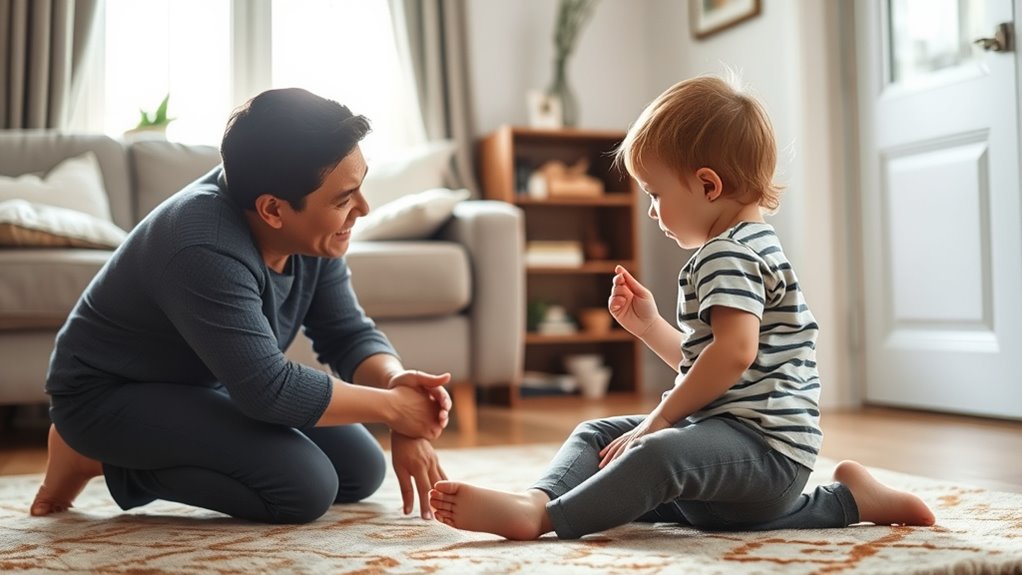Apologizing to your kids honestly shows them you value trust and emotional strength. It teaches accountability, humility, and how to handle mistakes constructively. By admitting when you’re wrong, you foster respect, deepen your connection, and model resilience. This honest approach encourages your children to be open and develop healthy emotional skills. If you keep exploring, you’ll discover how powerful this practice can be for building stronger, more authentic relationships.
Key Takeaways
- Apologizing models emotional intelligence, showing children how to handle mistakes with humility and empathy.
- It builds trust and strengthens the parent-child bond through honesty and vulnerability.
- Admitting errors demonstrates that perfection isn’t necessary, encouraging growth and accountability.
- Genuine apologies foster respect, mutual understanding, and open communication in the relationship.
- Parents who apologize teach children valuable life skills like responsibility, humility, and emotional resilience.

Have you ever wondered how apologizing to your kids can strengthen your relationship? It might seem counterintuitive—admitting fault can feel uncomfortable, especially when you want to be a strong, confident parent. But the truth is, apologizing is a powerful tool rooted in emotional intelligence and effective communication. When you acknowledge your mistakes honestly, you teach your children valuable lessons about accountability, humility, and respect. They learn that everyone makes errors, including their parents, and that taking responsibility is a sign of strength, not weakness. This openness fosters a deeper connection because your child begins to see you as authentic and trustworthy.
Apologizing isn’t just about saying sorry; it’s about modeling emotional intelligence. When you recognize your feelings, understand their impact, and express remorse, you demonstrate self-awareness and empathy. These qualities are essential for healthy relationships and help your kids develop their own emotional skills. When you admit, “I was wrong,” you show them how to handle mistakes constructively, encouraging them to do the same in their lives. This kind of effective communication, where emotions are openly shared and addressed, creates a safe space for your children to express their feelings and resolve conflicts respectfully.
Model emotional intelligence by acknowledging feelings, showing empathy, and fostering a safe space for honest communication.
Furthermore, when you apologize, you’re reinforcing that your relationship is more important than pride or ego. It shows your kids that it’s okay to be vulnerable and that true strength lies in owning your actions. This honesty helps build mutual respect, which is the foundation for a strong parent-child bond. Instead of hiding behind a façade of perfection, you become more relatable and approachable. Your children are more likely to come to you with their problems because they’ve seen that you handle your own mistakes maturely.
In practice, apologizing to your kids also enhances your communication skills. It encourages clarity and sincerity, which are *essential* for effective dialogue. When you apologize sincerely, you avoid misunderstandings and create an environment where your children feel heard and valued. Over time, this nurtures a family atmosphere grounded in trust and openness. Remember, no one expects perfection—what matters most is your willingness to be honest and to learn from your missteps. By doing so, you not only strengthen your relationship but also set a lasting example for your children to follow throughout their lives. Recognizing the importance of projector technology can teach them that continuous learning and adaptation are vital for growth.
Frequently Asked Questions
How Often Should I Apologize to My Children?
You should apologize to your children whenever you make a mistake, as it helps build parent-child trust and shows emotional modeling. There’s no set frequency; what matters is being genuine and consistent. Apologizing teaches them accountability and humility, fostering healthier relationships. When you admit fault, you strengthen bonds and show them that everyone makes errors, reinforcing that honesty and responsibility are valued traits.
What if My Child Doesn’T Accept My Apology?
When your child doesn’t accept your apology, respect boundaries and give them space to process their feelings. Remember, emotional intelligence helps you understand their perspective, even if they’re upset. You can gently acknowledge their feelings and reaffirm your intention to improve. Over time, patience and consistency show your commitment to building trust, helping your child feel safe and respected, which encourages healing and understanding in your relationship.
Can Apologizing Too Much Undermine My Authority?
You might worry that apologizing too often could undermine your authority, but it actually promotes trust and emotional consistency. When you balance sincere apologies with clear parenting boundaries, your kids learn that you’re honest and respectful. This strengthens your relationship and shows you’re confident enough to admit mistakes. Consistency in your responses and setting boundaries helps maintain your authority while fostering a healthy, open environment where your kids feel secure and respected.
How Do I Apologize When I’M Angry or Upset?
When you’re angry or upset, emotional regulation is key before apologizing. Take a moment to breathe and gather your thoughts, ensuring your apology is sincere and timely. Apologize when you feel calmer, so your words come across as genuine. This helps your kids understand accountability without feeling overwhelmed or confused. Remember, timely apologies foster trust and model healthy emotional responses, strengthening your relationship over time.
What Are the Long-Term Benefits of Consistently Apologizing?
You might notice that consistently apologizing strengthens your bond and builds trust with your kids over time. As you model accountability, you foster emotional resilience in them, teaching them it’s okay to acknowledge mistakes. This ongoing practice encourages open communication, making future conflicts easier to resolve. Ultimately, your willingness to admit faults creates a foundation of respect and honesty, shaping healthier relationships that last a lifetime.
Conclusion
When you apologize to your kids, you show them vulnerability and strength. Imagine a parent admitting, “I was wrong to raise my voice,” and seeing their child’s face soften with understanding. This moment builds trust and teaches humility. Remember, apologizing isn’t a sign of weakness but a way to strengthen your bond. Next time you slip up, own it—your kids will learn resilience and honesty from your example, making you a truly stronger parent.









